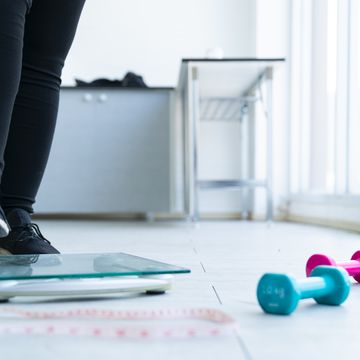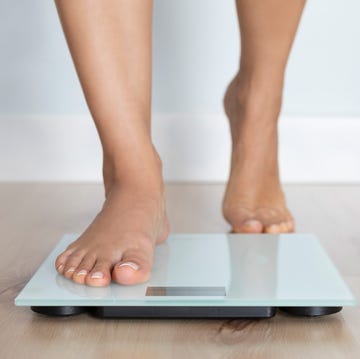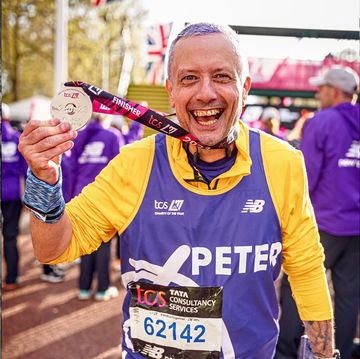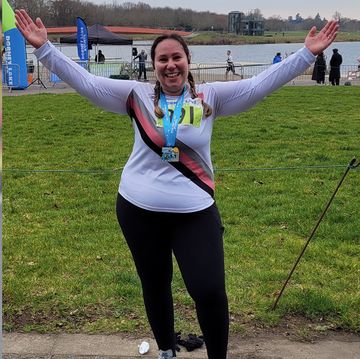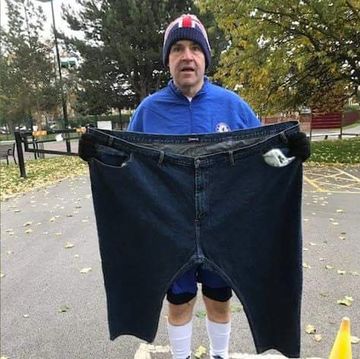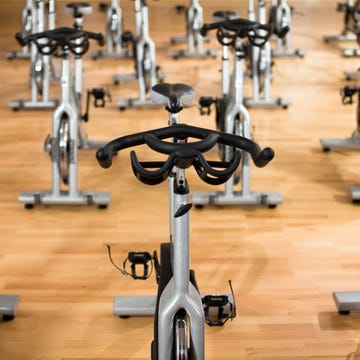If you've ever trained for a marathon, you probably expected to lose weight. And why not? Long runs that last two, three or four hours burn a serious number of calories. But many runners step on the scales just before race day and discover to their horror that instead of dropping pounds, they've added some.
Runners sometimes gain weight because they change their diets along with their mileage, or because other factors, such as hormonal fluctuations, come into play. And, occasionally, extra pounds are actually a sign things are going right. Here's why the numbers on the scales can go up during training and how to fuel yourself so you get to the start at an ideal weight.
You're hungrier...
Marathon training almost always requires more mileage, which boosts the number of calories you burn as well as your appetite. "Your body is trying to help fuel your increased activity," says Jenna Bell, a nutrition consultant and co-author of Energy to Burn. "One of the ways it does this is by making you hungry."
It's worse for women: researchers at the University of Massachusetts discovered this heightened sense of hunger is stronger in women than in men because exercise accelerates the production of appetite-regulating hormones, prompting them to eat more; men, it turns out, aren't as susceptible to these changes.
If you've just finished a three-hour run, you need a recovery meal containing carbs and protein, such as a chicken and vegetable stir-fry with brown rice, to restock energy stores and speed muscle repair. After that, Leah Sabato, a nutrition expert specialising in obesity treatment and prevention, suggests asking if you're still hungry or thirsty, or simply giving in to cravings.
"When your body truly needs food," says Sabato, "you'll experience fatigue, a rumbling stomach or hunger pangs that will accumulate over time." To keep cravings at bay and avoid unnecessary calories, remove temptations from your sight - if those fatty, salty crisps aren't sitting in plain view on the worktop, chances are they won't call your name.
You can also try a diversion, such as taking a walk; a study published in 2009 in the journal Appetite found that taking a brisk 15-minute walk reduces chocolate cravings. Or try using your stopwatch as a tool: force yourself to wait 20 minutes before giving in. After that time has lapsed, the urge to eat is usually no longer as strong.
You're overeating...
You go for a 10-mile run, come home starving and inhale a bowl of cereal, a smoothie, eggs, bacon, toast and maybe a few well-earned biscuits. Oops, you've just eaten 1,200 calories - a few hundred more than you burned on the run.
To limit overcompensation - that is, eating above and beyond what you need for recovery and thereby erasing the calorie deficit achieved during a workout - you need to make smarter food choices all day. Bell recommends eating mostly whole, minimally processed foods that are rich in carbohydrates, fibre and protein. The latter two take longer to digest, keeping hunger at bay and helping you avoid eating more than you should.
Sabato also warns runners against falling into the seductive 'I deserve it' mindset. "Going for a long run doesn't give you licence to eat a whole packet of biscuits," she says.
When you eat can also help you avoid overcompensating. The goal is to time your meals so that you provide your body with enough energy to fuel runs and your recovery, but without overdoing it.
If you eat a meal two to three hours before a workout, your body will be fuelled for your run and you won't feel hungry - this eliminates the need for a pre-workout snack, which adds extra calories. After a run, skip the recovery snack and instead sit down to a full meal within 30 minutes.
You're gaining muscle - and retaining fluid
Not all weight gain is bad. In some cases the pounds you may have put on can help you on race day. Months of training can reduce your body fat while adding muscle mass. Muscle is heavier than fat, which explains why the scales may have crept up even though you've probably lost a few inches around your waist and gained strength.
Another reason for weight gain just before a race is fluid retention. Not only do runners typically drink more in the days leading up to a race, but they also eat more carbs. These carbohydrates attract water, leading to possible fluid retention.
This fluid (and the energy from stored carbs) will help ensure you're hydrated and fuelled on race day. Fluid gains often disappear in the days after a race, when you're no longer loading up on carbs or hydrating as diligently.
Seven top tips on how to avoid the pounds and run your best race:
1. Pay attention: Are you increasing your mileage but devouring a post-run burger because you 'deserve' it? Such behaviour offsets the calories you burned logging miles.
2. Fuel up...within reason: Eat before a long run but you should have enough stored fuel for an easy three-miler, so skip the snack and just run.
3. Drink fluids: Optimal hydration can improve performance and reduce hunger. Hydrate before and after a workout and sip on calorie-free fluids throughout the day.
4. Choose carbs wisely: High-fibre foods are often low in calories but filling, so they're great for weight control. But they keep your digestive system moving, so avoid eating too much fibre right before you run.
5. Meet the man making running more inclusive: Don't fill up on carbs from processed grains and sweets. Instead, carb-load with filling, nutrient-dense whole grains such as brown rice and quinoa.
6. Cut back: A study in Proceedings of the Nutrition Society found that when people decrease activity after hard training, they often don't reduce their food intake, setting them up for weight gain.
7. Eat better: It’s okay to be mildly hungry before easy runs. Exercise temporarily reduces appetite, so your stomach will stop growling once you start running.




